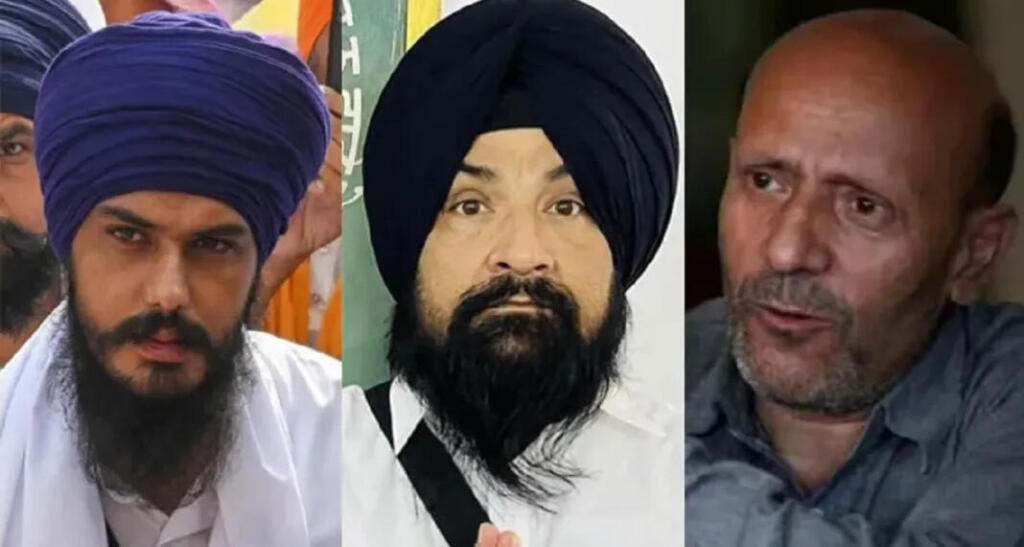The results of the 2024 Lok Sabha elections are in. The NDA alliance, led by the BJP, has secured an absolute majority. However, some surprising outcomes have emerged from the election results. The victory of separatist leaders in two seats in Punjab and one in Jammu and Kashmir has not only caused a stir in Indian politics but also raised questions about national security.
Amritpal Singh from Khadoor Sahib (Punjab), Sarabjit Singh Khalsa from Faridkot (Punjab), and Abdul Rashid Sheikh from Baramulla (Jammu and Kashmir) have demonstrated the depth of Indian democracy while also signaling a deep crisis.
Baramulla: A Signal from the Victory of a Separatist Leader
Independent candidate Abdul Rashid Sheikh received 45.7 percent of the vote in Jammu and Kashmir’s Baramulla Lok Sabha seat, defeating former Jammu and Kashmir Chief Minister and National Conference leader Omar Abdullah. This victory highlights the strength of democracy on one hand and the deep roots of separatist sentiments in Jammu and Kashmir on the other.
Abdul Rashid Sheikh is currently imprisoned in Delhi’s Tihar Jail under the Unlawful Activities (Prevention) Act (UAPA). His victory clearly indicates that the Indian government has much work to do to win the trust of the people in Jammu and Kashmir.
Faridkot: The Resurgence of Khalistani Sentiment
The victory of Sarabjit Singh Khalsa from Faridkot has revived the old roots of the Khalistani movement in Punjab. Sarabjit Singh Khalsa is the son of Beant Singh, the assassin of former Prime Minister Indira Gandhi. He received 298,062 votes, accounting for 29.38% of the vote share. This win is not only a personal success but also indicates that Khalistani sentiments are still alive in Punjab and could pose a serious threat to national security.
Khadoor Sahib: Amritpal Singh’s Challenge
In Khadoor Sahib, pro-Khalistan leader Amritpal Singh won with a significant number of votes. Amritpal Singh is currently detained in Dibrugarh Jail under the National Security Act (NSA). He received 404,430 votes, which amounts to a 38.62% vote share.
Amritpal Singh’s victory shows that pro-Khalistan elements are still influential in Punjab and that their political influence is growing. Amritpal Singh presents himself like Khalistani terrorist Jarnail Singh Bhindranwale and claims to be running a campaign against drugs, but his true intention is to revive the Khalistan movement, which is a dangerous signal for national security.
Risk of Access to Sensitive Parliamentary Documents
As MPs, these three leaders will have access to sensitive government documents that the general public cannot access. These documents could be used to influence public sentiment in the long run.
Therefore, it is crucial to ensure that these leaders do not have access to sensitive information. Previously, in the case of Mahua Moitra, it was seen how MPs shared their passwords with unauthorized persons, posing a threat to national security.
Balancing Democracy and National Security
The success of independent candidates is a testament to a fair electoral process, but the victory of separatist leaders could be a threat to national security. Their separatist and pro-Khalistan ideologies could disrupt the integrity and peace of the country. The government must seriously address the issues that are promoting separatist and extremist ideologies while maintaining the democratic process.
The victories of Abdul Rashid Sheikh, Sarabjit Singh Khalsa, and Amritpal Singh are warnings regarding national security. It is essential to respect democratic freedoms while strengthening security measures to control elements that could threaten national unity and integrity.
The recent election outcomes underscore the delicate balance between democracy and security. While democracy fosters freedom, it can also harbor threats if unchecked. Thus, safeguarding national security is imperative to preserve the essence of democracy. Awareness and vigilance are paramount to uphold democratic values while ensuring safety.
ALSO READ: Why This Bias Towards Kangana Ranaut?
